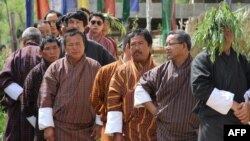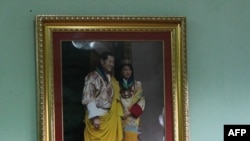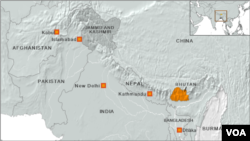NEW DELHI —
Bhutan's new government is preparing to take power following the country’s second-ever election, which consolidated democracy five years after its monarch gave up power.
Six years ago, Tashi Tobgay, a tour operator based in the Bhutanese capital, Thimphu, witnessed a mock election held to help people understand the concept of voting for political parties. Less than a week ago he voted in the second election held since the Bhutanese monarch decided to hand over power to a civilian government in 2008.
Most people in Bhutan are in favor of retaining close ties with India, which buys hydropower from Bhutan, the country’s main export, said Ura.
Six years ago, Tashi Tobgay, a tour operator based in the Bhutanese capital, Thimphu, witnessed a mock election held to help people understand the concept of voting for political parties. Less than a week ago he voted in the second election held since the Bhutanese monarch decided to hand over power to a civilian government in 2008.
The results were unexpected. The former main opposition People’s Democratic Party won a sweeping victory, winning 32 of the 47 seats in the National Assembly.
For Tobgay, the ouster of the old government demonstrates that democracy has taken roots in his country, which was largely insulated from the rest of the world until the turn of the century. He said he feels proud.
“I think Bhutan do[es] have a very good chance to showcase to the rest of the world that Bhutan do things differently," Tobgay said.
Political observers say when the King gave up power there was some apprehension among the Bhutanese due to the experience of neighboring countries such as Nepal and Bangladesh, where military coups, civil war and political infighting have tarnished people’s experience with democracy.
But Omair Ahmad at the Friedrich Naumann Foundation in New Delhi and author of a book on Bhutan said the Himalayan country has strengthened democracy through the second election.
“The turnout was higher than even in the first election," said Ahmad. "You have had a change of leadership, a party, and it has been done completely peacefully. Even the rhetoric has been fairly restrained. It is not a perfect picture, but it is a fairly good picture.”
The lively political debates among ordinary citizens in the days before the polls continue as people prepare for the new government to take over by the end of the month.
Karma Ura, head of the Center for Bhutan Studies in Thimphu and a member of the interim government that supervised the polls, said people are updating their understanding of politicians and parties very rapidly.
“I was very surprised by the shift in the choice, the new choice made by the people," said Ura. "I personally did not expect it. The old party did very well on service delivery side such as mobile connectivity, road construction and electrification of rural areas. However, I think more subtle things like decentralization of power, or management of very difficult areas of economy, shortages of rupee, these kind of things made the middle class perhaps and educated class little bit disenchanted about skills of old government.”
The new government in Bhutan has promised to develop stronger ties with India, with whom it depends for much of its trade. Just before the polls, India reduced gas and oil subsidies for its neighbor, causing prices to rise and sparking speculation that New Delhi was angry with the former government for making efforts to build friendly ties with China.
Political analysts say balancing ties with India and China has become an important part of the political discourse in the tiny country, which is sandwiched between the Asian giants.
Most people in Bhutan are in favor of retaining close ties with India, which buys hydropower from Bhutan, the country’s main export, said Ura.
“Solid progress depends on India’s cooperation. It [Bhutan] is landlocked, it is southward bound, it sells electricity to India, all this they want to continue, because it is so important for sustainable development of Bhutan. This is the only area from which we earn some money. This sector needs to develop.”
Tucked in the high Himalayas, Bhutan only permitted television and the Internet less than 15 years ago, and limits tourists in a bid to preserve its culture. The country still prefers to link its progress to what it calls the Gross National Happiness Index in place of economic indices such as Gross Domestic Product.
But as the new government takes over power by the end of the month, many younger Bhutanese are hoping it will also work to build a more vibrant economy and create more job opportunities. Among them is tour operator Tobgay, who is in his thirties.
“Bhutan needs to move forward to be part of the global village, but we need to move in a very wise way, not rush things, but take it as it comes," he said.
That is what many people in the country of about 700,000 people want: a careful balance between integrating with the rest of the world and preserving their culture.






